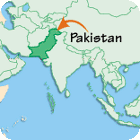 Located at the western end of the South Asia subcontinent, Pakistan enjoys a wide variation in geography, soil, altitude and climate. Therefore farmers grow a diversity of crops with adaptation ranging from tropical and subtropical to temperate climates. But 70% of the cultivated area is occupied by wheat, rice, cotton, sugarcane, chickpea and maize. Agriculture is the mainstay of Pakistan’s economy contributing 22% to national GDP.
Located at the western end of the South Asia subcontinent, Pakistan enjoys a wide variation in geography, soil, altitude and climate. Therefore farmers grow a diversity of crops with adaptation ranging from tropical and subtropical to temperate climates. But 70% of the cultivated area is occupied by wheat, rice, cotton, sugarcane, chickpea and maize. Agriculture is the mainstay of Pakistan’s economy contributing 22% to national GDP.
The National Agricultural Research System (NARS) consists of federal and provincial research establishments, agricultural universities and research organizations. Each structure has its own research establishments and its own research budget depending upon the suitability of a crop commodity in each respective province. There are at least 23 public research institutions involved in plant breeding and biotechnology, many of which are specialised in single crops. Although there are more than 600 registered seed companies (mostly small), very limited activities in plant breeding are being carried by the private sector. Almost all the breeding either through conventional or biotechnological tools is carried out in the public sector.
An efficient and competitive sustainable agriculture ensuring food security, and with ability to contribute to the economic development is the main focus of plant breeders and biotechnologists. Most of the breeding activities are linked to major crops (wheat, rice, cotton, sugarcane). The biotechnological approaches are also used in wheat, cotton, hybrid maize and sunflower. Almost all the crops are confronted with many biotic (diseases, insects and pests) and abiotic problems (drought, salinity, high temperature and climate change), so breeding efforts are focused on their improvement for higher yield and sustainable productivity by fighting against the stresses.
It is apparently difficult in Pakistan to train and retain staff in plant breeding. There are large numbers of PhD scientists, but they are spread thinly over a large number of institutions. Therefore, the inadequate number of breeders for each individual crop is the most limiting factor of Pakistan’s breeding programmes. That is followed by the inadequate access to literature. Finally, farmers need to be included in the breeding process to a greater degree than has been the case in the past.
Research and education institutes with activities in plant breeding
Public Institutes
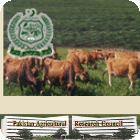 |
Pakistan Agricultural Research Council (PARC) is the apex agricultural research organization at the national level. Its main objective is to strengthen Pakistan's agricultural research system, comprising the federal and provincial components. PARC conducts research, especially of a basic and long term nature in areas of national importance. This research may be neglected or inadequately covered, or beyond the resources of the provincial institutions. They may require support in areas of sophisticated and costly equipment and facilities, as well as highly qualified but scarce manpower and frequent interaction with international agricultural research institutions.
|
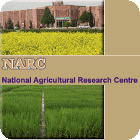 |
NARC, Islamabad, established in 1984, is the largest research centre of the Pakistan Agricultural Research Council (PARC). NARC coordinated programmes serve as a common platform for the scientists working in different federal, provincial agricultural research, and academic institutions to jointly plan their research activities, avoiding unnecessary duplication of research efforts. Research which can best be addressed at a national centre rather than by provincial institutions is undertaken at NARC.
|
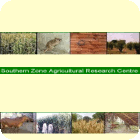 |
SARC is the second largest research establishment of the Pakistan Agricultural Research Council (PARC). Located at Karachi Sindh, more than 50 scientists at various research institutes are addressing issues in agriculture with particular reference to Sindh and partly Baluchistan provinces. Main research institutes at SARC are classified into plant production, plant protection, and livestock & Fisheries.
|
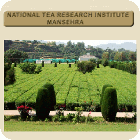 |
The major research thrust of the Institute is to develop tea production technology, including the selection of suitable varieties, standardization of agronomic practices and processing techniques. The institute is also making efforts to extend tea production technology to the prospective farmers.
|
 |
The main objectives of SCRI are to develop sugarcane varieties with high sugar yield for different agro-ecological zones of the country, to develop sugarcane varieties for stress conditions such as pests, drought, salinity, frost and high temperature, to develop agronomic requirements for the new varieties developed at the Institute, to produce basic seed of new varieties in collaboration with progressive farmers and to develop linkages between National and International Institutes for the exchange of scientific information, visits of scientists and training of manpower.
|
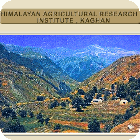 |
Located at the bottom of a valley surrounded by several mountains, this research station, established in 1972, has recently been reorganized by PARC management. HARI has a mandate to advance generations of various crops, to screen against various diseases and to multiply seed of promising lines.
|
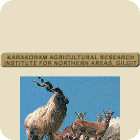 |
KARINA) is located in the Northern Areas, a far-flung, backward and difficult area of Pakistan. This institute is mandated to conduct research in Agriculture and provide technologies to the farmers to enhance production. KARINA has Trout Research & Multiplication Center, Medicinal Plants Research Unit, Seabuckthorn Research Unit and others for special crops, thus covering the entirety of the Northern Areas.
|
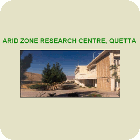 |
A project for the establishment of the Arid Zone Research Institute was approved by ECNEC in July 1971 and was put into operation in 1973-74. The headquarters of the Arid Zone Research Institute were established at Quetta (Balochistan), with one sub-station located in each province. Later the Institute was up-graded to the level of Centre and the Sub-Stations were upgraded to Institutes in 1996.
|
 |
NIBGE recently became a Centre of Excellence in Biotechnology by upgrading its infra-structure and improving the quality of scientific manpower. NIBGE has become a lead centre internationally for research on cotton leaf curl virus by deciphering the virus genetic code and documenting the genetic diversity existing in the field.
|
______________________________________
Information by Zahoor Ahmad (2007) - Information based on the Pakistan's full report from the PBBC survey.
Last revised 25-03-2010, GIPB.
 Located at the western end of the South Asia subcontinent, Pakistan enjoys a wide variation in geography, soil, altitude and climate. Therefore farmers grow a diversity of crops with adaptation ranging from tropical and subtropical to temperate climates. But 70% of the cultivated area is occupied by wheat, rice, cotton, sugarcane, chickpea and maize. Agriculture is the mainstay of Pakistan’s economy contributing 22% to national GDP.
Located at the western end of the South Asia subcontinent, Pakistan enjoys a wide variation in geography, soil, altitude and climate. Therefore farmers grow a diversity of crops with adaptation ranging from tropical and subtropical to temperate climates. But 70% of the cultivated area is occupied by wheat, rice, cotton, sugarcane, chickpea and maize. Agriculture is the mainstay of Pakistan’s economy contributing 22% to national GDP.








